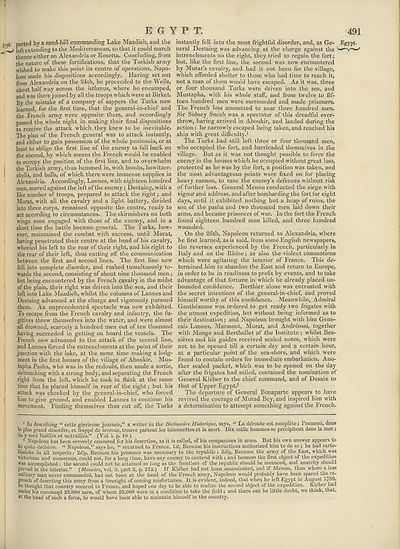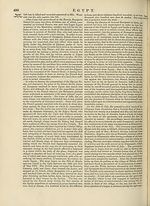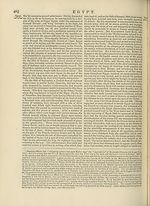Encyclopaedia Britannica > Volume 8, DIA-England
(501) Page 491
Download files
Complete book:
Individual page:
Thumbnail gallery: Grid view | List view

EGYPT.
491
ported by a sand-hill commanding Lake Maadieh, and the
left extending to the Mediterranean, so that it could march
thence either on Alexandria or Rosetta. Concluding, from
the nature of these fortifications, that the Turkish army
wished to make this point its centre of operations, Napo¬
leon made his dispositions accordingly. Having set out
from Alexandria on the 24th, he proceeded to the Wells,
about half way across the isthmus, where he encamped,
and was there joined by all the troops which were at Birket.
By the mistake of a company of sappers the Turks now
learned, for the first time, that the general-in-chief and
the French army were opposite them, and accordingly
passed the whole night in making their final dispositions
to receive the attack which they knew to be inevitable.
The plan of the French general was to attack instantly,
and either to gain possession of the whole peninsula, or at
least to oblige the first line of the enemy to fall back on
the second, by which means the French would be enabled
to occupy the position of the first line, and to overwhelm
the Turkish army, thus hemmed in, with bombs, howitzer-
shells, and balls, of which there were immense supplies in
Alexandria. Accordingly, Lannes, with eighteen hundred
men, moved against the left of the enemy; Destaing, with a
like number of troops, prepared to attack the right; and
Murat, with all the cavalry and a light battery, divided
into three corps, remained opposite the centre, ready to
act according to circumstances. The skirmishers on both
wings soon engaged with those of the enemy, and in a
short time the battle became general. The Turks, how¬
ever, maintained the combat with success, until Murat,
having penetrated their centre at the head of his cavalry,
wheeled his left to the rear of their right, and his right to
the rear of their left, thus cutting off the communication
between the first and second lines. The first line now
fell into complete disorder, and rushed tumultuously to¬
wards the second, consisting of about nine thousand men ;
but being encountered by the French cavalry in the midst
of the plain, their right was driven into the sea, and their
left into Lake Maadieh, whilst the columns of Lannes and
Destaing advanced at the charge and vigorously pursued
them. An unprecedented spectacle was now exhibited.
To escape from the French cavalry and infantry, the fu¬
gitives threw themselves into the water, and were almost
all drowned, scarcely a hundred men out of ten thousand
having succeeded in getting on board the vessels. The
French now advanced to the attack of the second line,
and Lannes forced the entrenchments at the point of their
junction with the lake, at the same time making a lodg¬
ment in the first houses of the village of Aboukir. Mus-
tapha Pasha, who was in the redoubt, then made a sortie,
debouching with a strong body, and separating the French
right from the left, which he took in flank at the same
time that he placed himself in rear of the right; but his
attack was checked by the general-in-chief, who forced
him to give ground, and enabled Lannes to continue his
movement. Finding themselves thus cut olf, the Turks
instantly fell into the most frightful disorder, and, as Ge- Egypt,
neral Destaing was advancing at the charge against the
intrenchments on the right, they tried to regain the fort;
but, like the first line, the second was now encountered
by Murat’s cavalryj and had it not been for the village,
which afforded shelter to those who had time to reach it,
not a man of them would have escaped. As it was, three
or four thousand Turks were driven into the sea, and
Mustapha, with his whole staff, and from twelve to fif¬
teen hundred men were surrounded and made prisoners.
The French loss amounted to near three hundred men.
Sir Sidney Smith was a spectator of this dreadful over¬
throw, having arrived in Aboukir, and landed during the
action : he narrowly escaped being taken, and reached his
ship with great difficulty.1
The Turks had still left three or four thousand men,
who occupied the fort, and barricaded themselves in the
village. But as it was not thought possible to force the
enemy in the houses which he occupied without great loss,
protected as he was by the fort, a position was taken, and
the most advantageous points were fixed on for placing
heavy cannon, to raze the enemy’s defences without risk
of further loss. General Menou conducted the siege with
vigour and address, and after bombarding the fort for eight
days, until it exhibited nothing but a heap of ruins, the
son of the pasha and two thousand men laid down their
arms, and became prisoners of war. In the fort the French
found eighteen hundred men killed, and three hundred
wounded.
On the 26th, Napoleon returned to Alexandria, where
he first learned, as is said, from some English newspapers,
the reverses experienced by the French, particularly in
Italy and on the Rhine; as also the violent commotions
which were agitating the interior of France. This de¬
termined him to abandon the East and return to Europe,
in order to be in readiness to profit by events, and to take
advantage of that fortune in which he already placed un¬
bounded confidence. Berthier alone was entrusted with
the secret intentions of the general-in-chief, and proved
himself worthy of this confidence. Meanwhile, Admiral
Gantheaume was ordered to get ready two frigates with
the utmost expedition, but without being informed as to
their destination ; and Napoleon brought with him Gene¬
rals Lannes, Marmont, Murat, and Andreossi, together
with Monge and Berthollet of the Institute ; whilst Bes-
sieres and his guides received sealed notes, which were
not to be opened till a certain day and a certain hour,
at a particular point of the sea-shore, and which were
found to contain orders for immediate embarkation. Ano¬
ther sealed packet, which was to be opened on the day
after the frigates had sailed, contained the nomination of
General Kleber to the chief command, and of Desaix to
that of Upper Egypt.2
The departure of General Bonaparte appears to have
revived the courage of Murad Bey, and inspired him with
a determination to attempt something against the French.
1 In describing “ cette glorieuse journde,” a writer in the Dictionaire Historique, says, “ La deroute est complete; I’ennemi, dans
le plus grand desordre, et frappe de terreur, trouve partout les baionnettes et la mort. Dix mille hommes se precipitent dans la mer;
ils y sont fusilles et mitrailles.” (Vol. i. p. 10.)
2 Napoleon has been severely censured for his desertion, as it is called, of his companions in arms. But his own answer appears to
be quite decisive. “ Napoleon,” says he, “ returned to France, 1st, Because his instructions authorized him to do so ; he had carte-
blanche in all respects: 2rf/y, Because his presence was necessary to the republic: ‘Sdly, Because the army of the Last, which was
victorious and numerous, could not, for a long time, have any enemy to contend with ; and because the first object of the expedition
was accomplished : the second could not be attained so long as the frontiers of the republic should be menaced, and anarchy should
prevail in the interior.” (Memoirs, vol. ii. part 2, p. 212.) It Kleber had not been assassinated, and it Menou, than whom a less
military man never commanded, had not been at the head of the French army, Napoleon would probably have been spared the ie-
proach of deserting this army from a foresight of coming misfortunes. It is evident, indeed, that when he ieftF.gypt in August 1799,
he thought that country secured to France, and hoped one day to be able to realize the second object of the expedition. Kleber had
under his command 28,000 men, of whom 25,000 were in a condition to take the field; and there can be little doubt, we think, that,
at the head of such a force, he would have been able to maintain himself in the country.
491
ported by a sand-hill commanding Lake Maadieh, and the
left extending to the Mediterranean, so that it could march
thence either on Alexandria or Rosetta. Concluding, from
the nature of these fortifications, that the Turkish army
wished to make this point its centre of operations, Napo¬
leon made his dispositions accordingly. Having set out
from Alexandria on the 24th, he proceeded to the Wells,
about half way across the isthmus, where he encamped,
and was there joined by all the troops which were at Birket.
By the mistake of a company of sappers the Turks now
learned, for the first time, that the general-in-chief and
the French army were opposite them, and accordingly
passed the whole night in making their final dispositions
to receive the attack which they knew to be inevitable.
The plan of the French general was to attack instantly,
and either to gain possession of the whole peninsula, or at
least to oblige the first line of the enemy to fall back on
the second, by which means the French would be enabled
to occupy the position of the first line, and to overwhelm
the Turkish army, thus hemmed in, with bombs, howitzer-
shells, and balls, of which there were immense supplies in
Alexandria. Accordingly, Lannes, with eighteen hundred
men, moved against the left of the enemy; Destaing, with a
like number of troops, prepared to attack the right; and
Murat, with all the cavalry and a light battery, divided
into three corps, remained opposite the centre, ready to
act according to circumstances. The skirmishers on both
wings soon engaged with those of the enemy, and in a
short time the battle became general. The Turks, how¬
ever, maintained the combat with success, until Murat,
having penetrated their centre at the head of his cavalry,
wheeled his left to the rear of their right, and his right to
the rear of their left, thus cutting off the communication
between the first and second lines. The first line now
fell into complete disorder, and rushed tumultuously to¬
wards the second, consisting of about nine thousand men ;
but being encountered by the French cavalry in the midst
of the plain, their right was driven into the sea, and their
left into Lake Maadieh, whilst the columns of Lannes and
Destaing advanced at the charge and vigorously pursued
them. An unprecedented spectacle was now exhibited.
To escape from the French cavalry and infantry, the fu¬
gitives threw themselves into the water, and were almost
all drowned, scarcely a hundred men out of ten thousand
having succeeded in getting on board the vessels. The
French now advanced to the attack of the second line,
and Lannes forced the entrenchments at the point of their
junction with the lake, at the same time making a lodg¬
ment in the first houses of the village of Aboukir. Mus-
tapha Pasha, who was in the redoubt, then made a sortie,
debouching with a strong body, and separating the French
right from the left, which he took in flank at the same
time that he placed himself in rear of the right; but his
attack was checked by the general-in-chief, who forced
him to give ground, and enabled Lannes to continue his
movement. Finding themselves thus cut olf, the Turks
instantly fell into the most frightful disorder, and, as Ge- Egypt,
neral Destaing was advancing at the charge against the
intrenchments on the right, they tried to regain the fort;
but, like the first line, the second was now encountered
by Murat’s cavalryj and had it not been for the village,
which afforded shelter to those who had time to reach it,
not a man of them would have escaped. As it was, three
or four thousand Turks were driven into the sea, and
Mustapha, with his whole staff, and from twelve to fif¬
teen hundred men were surrounded and made prisoners.
The French loss amounted to near three hundred men.
Sir Sidney Smith was a spectator of this dreadful over¬
throw, having arrived in Aboukir, and landed during the
action : he narrowly escaped being taken, and reached his
ship with great difficulty.1
The Turks had still left three or four thousand men,
who occupied the fort, and barricaded themselves in the
village. But as it was not thought possible to force the
enemy in the houses which he occupied without great loss,
protected as he was by the fort, a position was taken, and
the most advantageous points were fixed on for placing
heavy cannon, to raze the enemy’s defences without risk
of further loss. General Menou conducted the siege with
vigour and address, and after bombarding the fort for eight
days, until it exhibited nothing but a heap of ruins, the
son of the pasha and two thousand men laid down their
arms, and became prisoners of war. In the fort the French
found eighteen hundred men killed, and three hundred
wounded.
On the 26th, Napoleon returned to Alexandria, where
he first learned, as is said, from some English newspapers,
the reverses experienced by the French, particularly in
Italy and on the Rhine; as also the violent commotions
which were agitating the interior of France. This de¬
termined him to abandon the East and return to Europe,
in order to be in readiness to profit by events, and to take
advantage of that fortune in which he already placed un¬
bounded confidence. Berthier alone was entrusted with
the secret intentions of the general-in-chief, and proved
himself worthy of this confidence. Meanwhile, Admiral
Gantheaume was ordered to get ready two frigates with
the utmost expedition, but without being informed as to
their destination ; and Napoleon brought with him Gene¬
rals Lannes, Marmont, Murat, and Andreossi, together
with Monge and Berthollet of the Institute ; whilst Bes-
sieres and his guides received sealed notes, which were
not to be opened till a certain day and a certain hour,
at a particular point of the sea-shore, and which were
found to contain orders for immediate embarkation. Ano¬
ther sealed packet, which was to be opened on the day
after the frigates had sailed, contained the nomination of
General Kleber to the chief command, and of Desaix to
that of Upper Egypt.2
The departure of General Bonaparte appears to have
revived the courage of Murad Bey, and inspired him with
a determination to attempt something against the French.
1 In describing “ cette glorieuse journde,” a writer in the Dictionaire Historique, says, “ La deroute est complete; I’ennemi, dans
le plus grand desordre, et frappe de terreur, trouve partout les baionnettes et la mort. Dix mille hommes se precipitent dans la mer;
ils y sont fusilles et mitrailles.” (Vol. i. p. 10.)
2 Napoleon has been severely censured for his desertion, as it is called, of his companions in arms. But his own answer appears to
be quite decisive. “ Napoleon,” says he, “ returned to France, 1st, Because his instructions authorized him to do so ; he had carte-
blanche in all respects: 2rf/y, Because his presence was necessary to the republic: ‘Sdly, Because the army of the Last, which was
victorious and numerous, could not, for a long time, have any enemy to contend with ; and because the first object of the expedition
was accomplished : the second could not be attained so long as the frontiers of the republic should be menaced, and anarchy should
prevail in the interior.” (Memoirs, vol. ii. part 2, p. 212.) It Kleber had not been assassinated, and it Menou, than whom a less
military man never commanded, had not been at the head of the French army, Napoleon would probably have been spared the ie-
proach of deserting this army from a foresight of coming misfortunes. It is evident, indeed, that when he ieftF.gypt in August 1799,
he thought that country secured to France, and hoped one day to be able to realize the second object of the expedition. Kleber had
under his command 28,000 men, of whom 25,000 were in a condition to take the field; and there can be little doubt, we think, that,
at the head of such a force, he would have been able to maintain himself in the country.
Set display mode to:
![]() Universal Viewer |
Universal Viewer | ![]() Mirador |
Large image | Transcription
Mirador |
Large image | Transcription
Images and transcriptions on this page, including medium image downloads, may be used under the Creative Commons Attribution 4.0 International Licence unless otherwise stated. ![]()
| Encyclopaedia Britannica > Encyclopaedia Britannica > Volume 8, DIA-England > (501) Page 491 |
|---|
| Permanent URL | https://digital.nls.uk/193329518 |
|---|
| Attribution and copyright: |
|
|---|
| Description | Ten editions of 'Encyclopaedia Britannica', issued from 1768-1903, in 231 volumes. Originally issued in 100 weekly parts (3 volumes) between 1768 and 1771 by publishers: Colin Macfarquhar and Andrew Bell (Edinburgh); editor: William Smellie: engraver: Andrew Bell. Expanded editions in the 19th century featured more volumes and contributions from leading experts in their fields. Managed and published in Edinburgh up to the 9th edition (25 volumes, from 1875-1889); the 10th edition (1902-1903) re-issued the 9th edition, with 11 supplementary volumes. |
|---|---|
| Additional NLS resources: |
|

